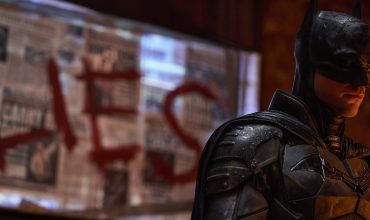“…and I felt saddest of all when I read the boring chapters that were only descriptions of whales, because I knew that the author was just trying to save us from his own sad story, just for a little while.”
A crumpled essay read a thousand times over, an allegedly broken webcam and a very sad story are at the centre of Darren Aronofosky’s The Whale, an adaptation of another author’s semi autobiographical play. Brendan Fraser makes a triumphant return to the spotlight as a man whose grief and self-destruction are outwardly visible but whose determination to reconcile with the daughter he left eight years prior drives his optimistic outlook. Like many of Aronofsky’s films, it is a harrowing tale of addiction, enabling and the lengths we go to to self-soothe when failed by those around us. It may not be a particularly fun experience, but what were you expecting?
Charlie (Fraser) is a person who pretends his camera is faulty while teaching online writing courses, yet implores his students to be honest in their work. He sees no one except Liz (Hong Chau), his nurse/friend who can’t quite get the message across that 238/134 is not an ‘okay’ blood pressure reading and Gambino’s pizza guy Dan, who is instructed nightly to leave two family-sized pizzas on the porch and take the cash from the letter box. Charlie is morbidly obese, suffers from angina attacks and doesn’t have health insurance, so instead of taking Liz up on her advice to go to the hospital for what is clearly congestive heart failure, he reads his favourite passage from an old essay on Moby Dick and waits for the pain to dissipate.
It is during such an attack that we (and Ty Simpkins’ missionary doorknocker Thomas) meet Charlie, one triggered by an afternoon masturbatory session to gay porn. Mortified to have left the laptop open (and in front of one of God’s children, no less), Charlie apologises to Thomas. But instead of leaving, Thomas takes the opportunity to try to convert him to the New Life church, an organisation with whom Charlie has some very warranted beef. As if his apartment is not already oddly populated, in walks Ellie (Sadie Sink), Charlie’s estranged teenage daughter who’s just been suspended from school for breaking their cyber bullying policy. Having tried to reach out to Ellie during eight years of denied contact, Charlie makes a deal with her: if she stays and writes something (anything) in her notebook for him, he’ll transfer the 120k in his savings account and help her rewrite her poorly-received essay.
For a film that takes place entirely in a second-storey apartment in Idaho, The Whale does a fantastic job of creating a world outside of it. We discover that Charlie’s life as we see it differs greatly to how it was prior to a devastating incident that he hasn’t been able to process in any healthy way. Having fallen in love with a male student, Charlie made the difficult choice to leave his family, believing his new life would have more of a detrimental effect on Ellie than removing himself altogether. We see how Charlie copes now – through horrifying binge eating sessions that nobody else is privy to – and the devastating effect it has had on his mobility and comfort in his own body. Tasks that would be simple for most (like picking up a dropped key) suddenly become almost impossible and I’m not sure a film has better conveyed the frustration and difficulty of living in a body this size without judgement or outright pity. The Whale is more concerned with themes of salvation, religious trauma and disgust under the guise of concern or love, with Aronofsky’s ponderance of faith-based hypocrisy repeated here as it was in mother! five years earlier.
Where The Whale is at its most interesting is in the ambiguity of its characters’ perspectives. Charlie forcibly sees the best in everything Ellie does, framing the cruel captions that accompany the nonconsensual photos she takes and uploads to social media as harsh but admirable truth-telling. It’s unclear whether this comes from genuine belief and optimism or the need to feel as though the person he abandoned will be okay despite his absence (in the past and likely, the future). Charlie’s ex-wife Mary (Samantha Morton) thinks she knows the real Ellie as she raised her alone, and what she sees in Ellie verges on evil. Does Mary feel this way out of self degradation, spurred on by her own alcoholism? Is Ellie just a teenager acting out in ways that anyone from a broken home would or is she indeed irrevocably broken? The questions raised are more important than their answers; just as well, because we get none.
Beneath layers of prosthesis and a heavy (physical and emotional) load lies the film’s beating heart in Sir Brendan Fraser (I’ve mentally knighted him – I can do that). Pushing himself further than ever before in his career, he delivers a performance that is as life affirming as it is heartbreaking. I’m not sure what hurts more: watching a person with an addiction willingly slip away in front of your eyes, or thinking about what Brendan Fraser must’ve been drawing from when delivering his most pained cries about needing to know he “did at least one thing right” in his life. I’ve been doing my part in the Brenaissance – marathoning what we 90s kids refer to as his ‘sexual awakening’ films with old friends between champagne breakfasts and prosecco afternoons – and the sheer pride it brings me to see this fine fellow back on an actual cinema screen is immeasurable. If a certain statue doesn’t land in his lap, I will be writing a letter.
The Whale’s success as an adaptation of a play was always going to depend on the careful selection of its entire cast and thankfully, the ten years it took to pin down Charlie allowed for extraordinary talent to reveal itself. The supporting performances are faultless, particularly Hong Chau (whose Elsa in The Menu deserves more recognition) and the always brilliant Samantha Morton as Mary. Sadie Sink’s emotional transition from teenage outrage to broken 8-year old girl is truly something to behold and if I wasn’t taking notice before, I am now.
This film is proving highly divisive, with some critics unable to agree on whether it is cruel in its depiction of morbid obesity or empathetic in its elevation of Charlie as a hero figure. Some have suggested that the casting of an actor who isn’t 600-pounds is unethical and that The Whale further perpetuates the stereotype that fat people are either to be laughed at or pitied. While I don’t have the energy to touch on the absurdity of the first point, I reject the second. Charlie is not presented in a way that elicits pity, disgust or humour; he is simply revealed to us wholly for deeper insight into his situation. And for those who do find The Whale ‘fatphobic’, count yourselves lucky; according to Deadline, we almost got lumped with James Corden.
You may have to get in the mood to watch The Whale (tissues will likely be supplied at the door) but if you do find yourself yearning for a sob and a slice of pizza, head to Luna’s Outdoor pre-film event. 8/10
The Whale is in cinemas Feb 2.


